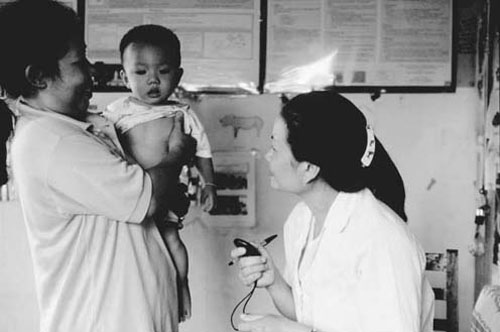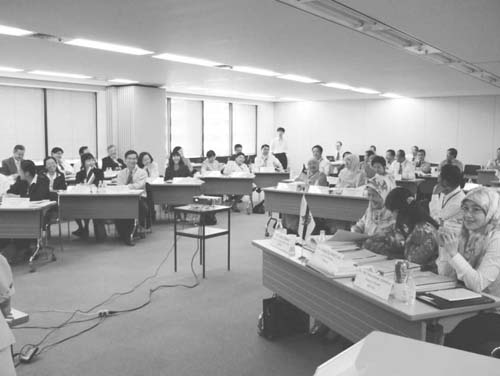Japan's Official Development Assistance White Paper 2006
Main Text > Part II ODA DISBURSEMENTS IN FISCAL YEAR 2005 > Chapter 2 Details about Japan's ODA > Section 2. Measures for Each of the Priority Issues > 1. Poverty Reduction > (2) Health and Welfare
(2) Health and Welfare
In many developing countries, a large number of people suffer from a lack of basic health services that are usually available in developed countries. Three goals of the MDGs relate to health, for contributing to poverty reduction: reducing child mortality; improving maternal health; and combating HIV/AIDS, malaria, and other diseases.
In May 2003, the Harmonized Action on the Health, Nutrition, and Population MDGs Meeting was held through the co-sponsorship of the World Bank, Canada, and the United Kingdom. Following this the High-level Forum on Health MDGs has been held a total of three times in Geneva, Abuja (Nigeria), and Paris. At these events discussions were held on the themes of human resources and global cooperation and coordination. In addition, greater recognition was given by the international community regarding the importance of efforts for the achievement of the MDGs in health-related areas.

A scene of the High-Level Forum (HLF) on the Health Millennium Development Goals (MDGs) in Asia and the Pacific
At these high-level forums Japan proposed holding a meeting for the Asian/Pacific region. In cooperation with the World Bank, the Asian Development Bank (ADB), and the World Health Organization (WHO), the Japanese Government hosted the High-Level Forum on the Health MDGs in Asia and the Pacific in June 2005. The forum was held with high-level participants of 24 countries in the Asia-Pacific region, including 11 ministers and senior officials from ministries in charge of health, finance and development, as well as from donor countries, international organizations, and NGOs to discuss the current status and issues faced in meeting the health-related MDGs.
At this forum Japan announced the Health and Development Initiative (HDI), which is focused on the achievement of the health-related MDGs, and the participating countries expressed a strong sense of anticipation toward the further strengthening and enhancement of efforts. Based on the HDI, Japan has been working to comprehensively assist in maternal and child health and measures against infectious diseases with a view to enhancing the foundations for health, by upgrading health systems and by implementing cross-sectoral assistance. Cross-sectoral assistance includes assistance for gender equality assistance, education, water and sanitation, and the development of infrastructure.
The following paragraphs will outline Japan's efforts concerning assistance for upgrading health systems, assistance for maternal and child health, and international cooperation (see Chapter 2, Section 2 for measures against infectious diseases).
A. Assistance for Strengthening Health Systems
For assistance from the international community for health, attention tends to be focused on direct countermeasures against diseases. Examples of this include the fight against HIV/AIDS through the provision of anti-retrovirals to patients, vaccinations against infectious diseases in children, and the distribution of mosquito nets to counter malaria. On the other hand, Japan believes that, concurrent with such countermeasures for diseases, strengthening the foundation for health in developing countries plays an extremely important role in addressing health challenges, such as disease prevention. Therefore, Japan has been placing emphasis on "primary health care" that provides basic health care services equally to a larger number of people, laying particular stress on developing nationwide health systems. It assists in efforts like enhancing regional health care and prevention activities, as well as system building, capacity development of health-related personnel, and infrastructure development in line with the situation of each developing country. As an example of such assistance, the Project for the scaling up of CHPS (Community-based Health Planning and Service) Implementation in Upper West Region of Ghana, a technical cooperation project, is being implemented for a scheduled five-year period starting in FY2006. The project is focused on the Upper West Region of Ghana where the degree of poverty is particularly serious. It aims to expand basic health services in rural areas in this region by enhancing the capabilities of District Health Management Teams (DHMT), community health workers, and the recipient communities themselves. Japan is providing cooperation for these efforts through a program approach by means of grant aid to the region, as well as by cooperating with JOCV. In addition, the Planning Study on Strengthening Management for the Sri Lankan National Health System is currently being implemented as a development study in Sri Lanka. The objectives of the study include the formulation of operations improvement plans and the improvement of management in medical facilities, as well as comprehensive plans for the prevention of chronic diseases.
B. Assistance for Maternal and Child Health
Issues surrounding maternal and child health encompass a wide range of aspects from health care services, health care systems, and public health to the social environment that surrounds women who are to carry and nurture children. In developing countries, especially least developed countries (LDCs), urgent attention is needed to improve the health of pregnant and nursing women, reduce infant mortality and illnesses, and promote measures against HIV/AIDS and other sexually transmitted diseases.
To improve the health of pregnant and nursing mothers, Japan provides assistance in training personnel engaged in maternal and child health care services such as midwives and nurses, developing emergency obstetrical care systems, and securing physical and social access to emergency obstetrical care facilities (e.g., road development and the creation of a social environment in which women can receive proper obstetrical treatment). On top of this, Japan works toward providing assistance in order to reduce unwanted pregnancies by providing education and information on family planning, improving access to birth control methods and contraceptives, and promoting the education of adolescents. For example, in the Reproductive Health Project (Phase II) in Nghe An province for Viet Nam, one of the country's impoverished areas, Japan provided education for clean births to regional health workers and midwives. Aside from this, it also assisted in improving reproductive health through awareness-raising activities for local residents and similar efforts.
To reduce infant mortality and diseases, Japan assists in providing vaccination against diseases that could lead to deaths of infants such as polio, measles, and tetanus, as well as malaria countermeasures like distributing mosquito nets (see Chapter 2, Section 2 for details on distributing mosquito nets). Assistance is also provided for developing basic health services which aim to promote universal usage of Oral Rehydration Salt (ORS) to combat diarrhea in children. In Laos the Project for Strengthening Health Services for Children is being implemented for Oudomxai Province with the aim of strengthening child health services. The activities include capacity development for health workers and the enhancement of regulatory functions of school and health service institutions, which were implemented while emphasizing a participatory approach.

The Project for Strengthening Health Services for Children implemented in Laos (Photo: JICA)
Regarding measures against HIV/AIDS and other sexually transmitted diseases, efforts must be promoted from the respective aspects of prevention, treatment, and care. Taking into account access to health care services and information, assistance is given with consideration from various perspectives and a comprehensive approach. For example, measures against sexually transmitted diseases and Voluntary Counseling and Testing (VCT) have been introduced as part of reproductive health services.
As with projects like the Project to Develop Maternal and Child Health Facilities in Mahajanga Province implemented in Madagascar in FY2005, Japan is working on bilateral cooperation oriented toward improving maternal and child health, and the skill and capacity development of medical personnel involved in maternal and child health. In addition, Japan has been cooperating in UNICEF-led efforts for developing emergency obstetrics medical services, as well as in other multilateral efforts including those involving the United Nations Population Fund (UNFPA) and the International Planned Parenthood Federation (IPPF), which is an international NGO. In Timor-Leste, Japan provided assistance for UNICEF's Project for Improving Maternal and Child Health Care in the Democratic Republic of Timor-Leste to address the issues of infant illnesses and provide support before and after childbirth within Timor-Leste's medical institutions.
C. International Cooperation
Japan collaborates with various partners in providing health sector assistance through policy dialogue, project planning, implementation, and monitoring and evaluation. For example, MOFA periodically holds round table discussions aimed at exchanges of opinions and information with Japanese NGOs involved in assistance in health fields. With UNICEF, Japan has been continuing assistance to eradicate polio since the beginning of the 1990s. In recent years, the cooperation has expanded to vaccination against infectious diseases such as measles and tetanus, distribution of mosquito nets and other malaria countermeasures, and safe water supply. Japan also cooperates with the United States Agency for International Development (USAID) for the efficient and effective implementation of aid based on the US-Japan Partnership for Global Health. An action plan for 2006-2007 was formulated at the third review meeting for this partnership held in January 2006 in Tokyo. This plan defined measures against infectious diseases like HIV/AIDS, tuberculosis, malaria, polio, and avian influenza, as well as efforts for strengthening health systems as priority challenges.
Regarding relations with ASEAN, Japan held the 4th ASEAN and Japan High Level Officials Meeting on Caring Societies at the end of August 2006 with the cooperation of the ASEAN Secretariat and WHO. High-level officials in charge of social welfare and health policies from 10 ASEAN countries were invited to attend the meeting (a total of 39 people took part from 10 ASEAN countries, including 2 at the vice ministerial-level). At the meeting, which was held under the theme of "Cooperation and Human Resources Development for Social Welfare and Health Services," the focus was placed on assistance for the socially vulnerable (children and women). Information and experience regarding the situation in each country, countermeasures, and model cases were shared at the meeting, and constructive recommendations were made for the future efforts of the ASEAN countries.

The 3rd ASEAN and Japan High Level Officials Meeting on Caring Societies (Photo: Ministry of Health, Labour and Welfare)
Column II-2 Republic of South Africa: Provision of Educational Material for the Dominican School for the Deaf Children


 Next Page
Next Page